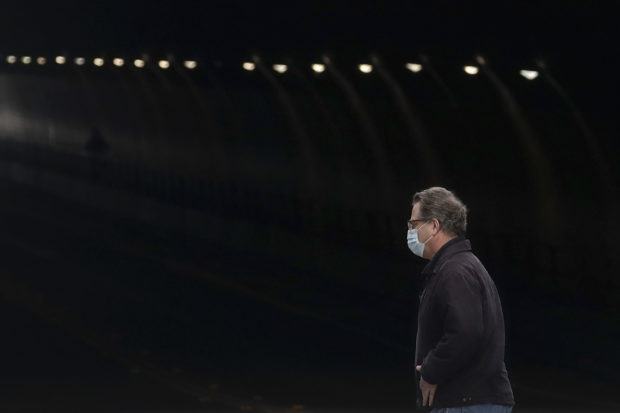Should you wear mask in public if not sick with coronavirus?
WASHINGTON — If you’re not sick with the new coronavirus, should you wear a mask in public? The World Health Organization says no. U.S. officials are mulling if eventually, that advice might change.

A man wears a mask while crossing in front of the Stockton Street Tunnel in San Francisco, Sunday, March 29, 2020. Californians endured a weekend of stepped-up restrictions aimed at keeping them home as much as possible while hospitals and health officials scrambled Sunday to ready themselves for a week that could see the feared dramatic surge in coronavirus cases. (AP Photo/Jeff Chiu)
That debate is happening amid a shortage so severe that the Joint Commission, which accredits U.S. hospitals, said Tuesday that if facilities can’t provide proper masks, health workers are allowed to bring their own from home.
Front-line health workers have the greatest need for masks. And when people are sick, wearing a mask helps lessen the chances of infecting others. In places where relatives care for the sick at home, the WHO also has recommended they wear a mask.
But “there is no specific evidence to suggest that the wearing of masks by the mass population has any particular benefit,” WHO’s epidemics chief Dr. Mike Ryan told reporters Monday.
“In fact, there’s some evidence to suggest the opposite,” he added, noting risks from an improperly fitted mask or touching the face while taking it off or putting it on.
For months as the COVID-19 crisis grew and masks disappeared from store shelves, U.S. health officials have agreed. The virus is believed to spread mostly through droplets from coughs or sneezes rather than tinier particles that health workers can encounter, and thus the main advice has been to keep your distance — staying 6 feet away.
Article continues after this advertisement“Seriously people – STOP BUYING MASKS!” Surgeon General Jerome Adams wrote in a February 29 tweet. “They are not effective in preventing general public from catching #Coronavirus but if healthcare providers can’t get them to care for sick patients, it puts them and our communities at risk.”
Article continues after this advertisementBut mask-wearing has long been common in some countries during respiratory outbreaks, especially in parts of Asia. But as questions grow about whether people sometimes can spread the virus before realizing they’re sick — which social distancing is supposed to address — increasingly people ask what it would hurt to wear some form of mask in public.
Dr. Anthony Fauci, infectious disease chief at the U.S. National Institutes of Health, said the White House coronavirus task force is looking into the idea but first must make sure that such a move wouldn’t take away from the supply for health workers.
“But once we get in a situation where we have enough masks, I believe there will be some very serious consideration about more broadening this recommendation of using masks,” Fauci said in a CNN interview Tuesday. “We’re not there yet, but I think we’re close to coming to some determination.”
For now, the advice posted on the Centers for Disease Control and Prevention’s website: “If you are NOT sick: You do not need to wear a face mask unless you are caring for someone who is sick (and they are not able to wear a face mask).”
GSG
For more news about the novel coronavirus click here.
What you need to know about Coronavirus.
For more information on COVID-19, call the DOH Hotline: (02) 86517800 local 1149/1150.
The Inquirer Foundation supports our healthcare frontliners and is still accepting cash donations to be deposited at Banco de Oro (BDO) current account #007960018860 or donate through PayMaya using this link.